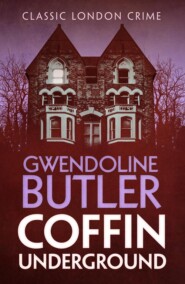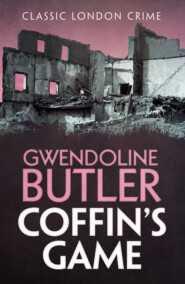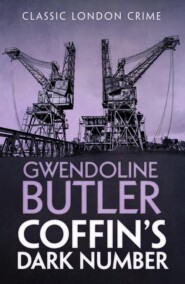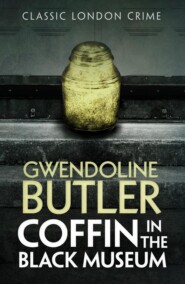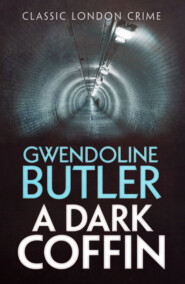По всем вопросам обращайтесь на: info@litportal.ru
(©) 2003-2024.
✖
A Coffin for Charley
Автор
Год написания книги
2019
Настройки чтения
Размер шрифта
Высота строк
Поля
She was alarmed.
John Coffin, Chief Commander of the Second City Police Force, looked out of his window in his office. He got a better view from the sitting-room of the tower in St Luke’s Mansions, where he lived, sometimes with Stella and sometimes without her, but his view had improved since one tower block of council flats had been knocked down before it fell down so that he got a distant view of the river. He enjoyed looking out …
It was something he did quite often. Partly because it gave him pleasure to look down on this London which he loved (although he would not have admitted to the feeling) and partly because (and again would he have admitted it?) he liked to keep an eye on it.
It was a rough world down there and famously criminous. New wealth had not changed old ways. There were groups of streets where Victorian Peelers had refused to go except in pairs; there were still streets in which constables on the beat liked to feel they had good back-up. But he did not allow NO GO areas. Everywhere was policed.
It was the Queen’s Peace he was responsible for keeping and he trusted she was grateful. Whispers had come to him about the next Honours List, so he supposed she was. He already had the Queen’s Police Medal, awarded when he took up his present position.
If he did get an honour it would be a surprise since he had had several close brushes with his local MP and the Police Committee. The fact that they then passed what amounted to a vote of confidence in him did not mean they loved him the better.
Within his authority he had the old boroughs of Spinnergate, Leathergate, Swinehouse, and East Hythe, whose very place names testified to their antiquity. The Vikings had got as far as these four Anglo-Saxon settlements in their ravages up the Thames, the Norman warlords had swept in replacing the old English landowners, but the indigenous population had survived and their descendants, spiced with immigrants from every land within the old Empire, were there now, tough, wily and ready to cause trouble. They had never been particularly law-abiding and recent events had done nothing to change their mind. New money had poured into the district in the last decade turning old warehouses and dockside buildings into offices and luxury apartments, and the old poor still in their terrace houses or council housing were resentful. Ill-feeling had turned to wicked mirth as the new rich became victims of the recession.
He had in his bailiwick several hospitals, a university, numerous schools, and a high number of bookmakers’ shops. One legal casino and one illegal gambling house that moved on and reopened as soon as it was closed down. He had at least two brothels which called themselves Party Clubs, a flourishing transvestite night club, and a variety of religious foundations including chapels, churches and one man who was building a replica of Stonehenge in his back garden. Very handsome it was too, if necessarily on the small side. Its creator, Mr James Eldon, told the local press that he was not a Druid or worshipping a Bronze Age goddess, his motives were purely æsthetic: he just fancied it. He had invited the Chief Commander to a glass of nettle wine and a view of his henge.
Coffin had not gone but he had warmed to Mr Eldon as one of the most harmless of his eccentrics.
As he continued looking out of his window, he knew that at any one time he had in his area any number of juvenile delinquents, several rapists, a clutch of child molesters, numerous sexual deviants more or less within the law, at least one murderer who was known but against whom they could not get proof, one killer who was about to be arrested, and possibly more than he cared to think about that were secret and undetected in their murders.
It was these last ones that worried him most.
He turned away from the window with a yawn. Tarts, rogues, evil-doers and saints, he had them in his care. He had known one saint himself but she was dead; it was really just as well because otherwise he might have been obliged to send her to prison.
He yawned again. Detective Chief Inspector Young looked at him with sympathy. He was tired himself having been up all night on a murder inquiry.
‘It’s the heat,’ said Coffin. He was talking to Young because he was dealing with the case, which was a sensitive one in which an MP had been, still was, involved. ‘Go on.’
‘He said: “It’s nothing to do with you who I fuck or who I don’t. Push off.”’
‘Nice fellow.’
‘No witnesses,’ said Young briefly. ‘He knew I couldn’t quote. He was drunk,’ he added in a neutral voice.
Job Titus, MP. He had started in one political party, crossed the floor of the House to join another, and finally set out his own stall. No settled party, continually changing his opinions, an Independent, very popular in his constituency, but as someone once said: ‘Of no fixed abode intellectually.’ A drinker, famous for it, violent, and famous for that too, and twice divorced. ‘Where does he get his money?’ people asked. ‘Where does he get his energy?’ others said. He had a crest of yellow curls and bright blue eyes. A political gigolo.
‘And the girl’s dead?’
‘And the girl’s dead.’
Silence for a short space.
‘How was she killed?’
Young pursed his lips. ‘There was a bit of doubt at first, but the informed opinion is that there was an attempt to strangle her and then she was smothered. Manually. Hand over her mouth and nose.’
Marianna Manners had been a ballet dancer, out of work, but hopeful of joining a big London company. Meanwhile she had tried for all sorts of other parts because she could act a bit and one thing could lead her to another. In her case it looked as if it had. She had a wide circle of friends and lovers, one of whom might be Job Titus, MP, but there was no proving it. She had said Yes to her friends, he said No to the police.
‘Nasty … And Job Titus?’
‘No evidence that points to him in a strong way. He’s been seen drinking in the Balaclava Arms talking several times to one man and that makes me wonder.’
The Balaclava Arms in Spinnergate had a bad reputation. It was known as Drinking in Hell.
‘And he knew her. And she claimed it was more than that. They both lived in Swinehouse in the same block of flats. And I’d love to get him for it.’ He didn’t say the last sentence aloud.
‘Yes,’ said Coffin, agreeing with what hadn’t been said. ‘That’s it for the moment, then?’
‘Right.’
‘What sort of a girl was she?’
‘Nice-looking, of course. Well made-up, well turned out. Quite expensive clothes. One strange thing for a girl like her … she had badly bitten fingernails. Didn’t really try to cover them up, either. No varnish or anything like that. Almost as if she didn’t care.’
The two men had a friendly relationship which stretched outside working hours because their wives were friends. Stella Pinero and Alison, the ambitious, brilliant young wife of the Chief Inspector, had met at an official party and taken a great liking to each other.
The police service being what it was, Coffin and Young had to keep a certain distance at work (although well aware that the married lives of both had come under female discussion), but it made for friendliness.
It enabled Archie Young to say: ‘Annie Briggs has been in again.’
Coffin frowned. ‘What is it this time?’
‘She thinks she’s being watched.’
‘She might well be.’ He walked to the window again to look out. ‘Haven’t been any death threats lately, have there?’
‘No. None that I’ve heard of. But they’re a grudging lot, the Creeley clan, and they never forget. Pity they came back from New Zealand, I was a lot happier when it looked as though they’d emigrated. But they’re back and in the same street, the same house. Well, the boy is, there’s only him left now, he came back and moved in.’
‘Wonder how he managed that?’ Property being what it was.
‘Never sold it. Just moved back in.’
Coffin was curious. ‘What sort of household does he run there?’
‘Not as bad as you might think. It was very mucky, the tenants not having been as careful as might be, but the young one, grandson Eddie, has been painting and gardening. He’s on his own at the moment although the odd cousin has been to stay.’
‘How do you know all this?’
‘Community policing,’ said Young. ‘The local officer managed to insert himself in the house for a look round. He had a word with Eddie about car parking, Eddie Creeley has three old bangers parked outside and the neighbours were complaining. Eddie’s a car mechanic as hobby but he’s working in a hospital. Our man reported favourably on him. I think he liked him.’
‘I didn’t think you could like a Creeley.’
‘The old lady’s gone, of course. But her spirit lives on. Anyone who does a Creeley down gets it back in spades. They’ve never forgiven Annie, that’s the story. Or you, for that matter.’
‘They won’t do anything now. It’s too late, too long ago. Oh, writing on her front door, dog dirt through the letter-box …’
‘They did all of that in the past, but not lately, not since the shift back from New Zealand. Perhaps Eddie’s different, who knows?’
‘I know old Mrs Creeley said one or other of them would kill Annie in the end. They never took that back. Never did much about it, either.’






